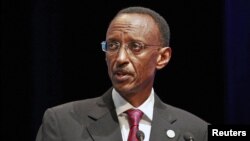Rwanda has asked the International Criminal Court to let it address the court in the trial of Kenyan President Uhuru Kenyatta and Deputy President William Ruto.
“What we have done basically is to request the court to allow [us] to address it as a non-member of the Rome Statute, because we are not members of the Rome Statute,” said Rwanda’s Attorney General and minister of Justice, Busingye Johnston. “We think we can be of use to the court in terms of the interpretation of certain aspects regarding scheduling and the approach of the court to the planning and scheduling of matters.”
Judges at the ICC have yet to decide on Rwanda’s petition.
Rwanda is not a signatory to the Rome Statute, which established the Hague-based court.
Some analysts say Kigali’s ICC petition could signal President Paul Kagame administration’s intension to become a signatory to the Rome Statute or of becoming a member of the ICC. But, Johnston disagreed.
“No. We are not planning to become a member of the Rome Statute that’s not the case,” said Johnston. “We have requested as non-members of the Rome Statute, which we think is allowed. So, we are not planning to sign up to the Rome Statute.”
Some observers have questioned the timing of Rwanda’s request to address the court at the time when Mr. Kenyatta and Mr. Ruto face the ICC over charges they played a key role in their country’s 2007-2998 post-election violence that left about 1,300 people dead. Johnston outlined the rationale behind Rwanda’s petition.
“The significance is that we want to address the court about our interpretation of certain articles in the Rome Statute with specific regard to the ongoing prosecution against the journalist, the deputy president and His Excellency [Kenyatta] the president of the republic of Kenya. So, it’s not just a coincidence. It’s in relation to that particular case,” said Johnston.
Johnston says if the approval is given, Rwanda would want to talk to the court about the impact of the timing of the trial of both Kenyan leaders.
“It is generally on the issues around scheduling, for example, if you have two high-ranking government officials attending a court, would you want to have both of them at the same time out of their countries when they also at work back home at their own country?” said Johnston.
The ICC accuses Ruto and President Uhuru Kenyatta of human rights abuses through involvement in Kenya’s 2007-2008 post-election violence that left about 1,300 dead and hundreds of thousands displaced from their homes. Former radio host Joshua Arap Sang, is also accused of involvement in the violence.
Johnston declined to speculate about the possible success of Rwanda’s petition to the ICC.
“Honestly, my guess is as good as yours,” said Johnston. “Granting of the request is a complete reserve of the judges of the court. You can only make a request [and] that is what we have done.”
“What we have done basically is to request the court to allow [us] to address it as a non-member of the Rome Statute, because we are not members of the Rome Statute,” said Rwanda’s Attorney General and minister of Justice, Busingye Johnston. “We think we can be of use to the court in terms of the interpretation of certain aspects regarding scheduling and the approach of the court to the planning and scheduling of matters.”
Judges at the ICC have yet to decide on Rwanda’s petition.
Rwanda is not a signatory to the Rome Statute, which established the Hague-based court.
Some analysts say Kigali’s ICC petition could signal President Paul Kagame administration’s intension to become a signatory to the Rome Statute or of becoming a member of the ICC. But, Johnston disagreed.
“No. We are not planning to become a member of the Rome Statute that’s not the case,” said Johnston. “We have requested as non-members of the Rome Statute, which we think is allowed. So, we are not planning to sign up to the Rome Statute.”
Some observers have questioned the timing of Rwanda’s request to address the court at the time when Mr. Kenyatta and Mr. Ruto face the ICC over charges they played a key role in their country’s 2007-2998 post-election violence that left about 1,300 people dead. Johnston outlined the rationale behind Rwanda’s petition.
“The significance is that we want to address the court about our interpretation of certain articles in the Rome Statute with specific regard to the ongoing prosecution against the journalist, the deputy president and His Excellency [Kenyatta] the president of the republic of Kenya. So, it’s not just a coincidence. It’s in relation to that particular case,” said Johnston.
Johnston says if the approval is given, Rwanda would want to talk to the court about the impact of the timing of the trial of both Kenyan leaders.
“It is generally on the issues around scheduling, for example, if you have two high-ranking government officials attending a court, would you want to have both of them at the same time out of their countries when they also at work back home at their own country?” said Johnston.
The ICC accuses Ruto and President Uhuru Kenyatta of human rights abuses through involvement in Kenya’s 2007-2008 post-election violence that left about 1,300 dead and hundreds of thousands displaced from their homes. Former radio host Joshua Arap Sang, is also accused of involvement in the violence.
Johnston declined to speculate about the possible success of Rwanda’s petition to the ICC.
“Honestly, my guess is as good as yours,” said Johnston. “Granting of the request is a complete reserve of the judges of the court. You can only make a request [and] that is what we have done.”
